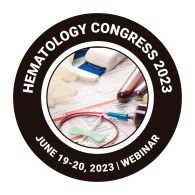Sessions and Tracks
Track 1: Hematology
Hematology is a department of clinical medicine which offers with prognosis and treatment of blood problems and blood cancers. Hematologists and hematopathologists mainly work together to form a determination and convey the most suitable treatment if necessary. Diseases treated under Hematology are
-
Acute Leukemia
-
Chronic Leukemia
-
Plasma Cell disorders
-
Lymphoma – Hodgkin / Non Hodgkin
-
Myeloproliferative Neoplasms
-
Thalassemia and other haemoglobinopathies
-
All types of coagulation and thrombotic disorders
-
Hemoglobin and platelet disorders
Recommended Associations: Australian Hematology Association, American Hematology Association, English Cell Therapy Society, English Cell Therapy Association, Canadian Hematology Association, Canadian Association of Cell Therapy, European Hematology Association, European Federation of Stem Cell Research, FDI World Transfusion Medicine Federation, Indian Cell Therapy Association, Global Association for Hematology, Society for Hematology and Cell Therapy, Japanese Society of Blood Transfusion, Japanese Society of Pediatric Hematology, Japan Thrombosis and Coagulation Association
Track 2: Cell Therapy
Cell Therapy is the transfer of cells into a patient with a goal of improving the disease. From beginning blood transfusions were considered to be the first type of cell therapy to be practiced as routine. Later, Bone marrow transplantation has also become a well-established concept which involves treatment of much kind of blood disorders including anemia, leukemia, lymphoma and rare immunodeficiency diseases. Alternative medical practitioners perform cell therapy in the form of several different names including xenotransplant therapy, glandular therapy, and fresh cell therapy. It has been claimed by the proponents of cell therapy that it has been used successfully to repair spinal cord injuries, strengthen weaken immune system, treats autoimmune diseases like AIDS, help patients with neurological disorders like Alzheimer’s disease, Parkinson’s disease and epilepsy.
Recommended Associations: Australian Hematology Association, American Hematology Association, English Cell Therapy Society, English Cell Therapy Association, Canadian Hematology Association, Canadian Association of Cell Therapy, European Hematology Association, European Federation of Stem Cell Research, FDI World Transfusion Medicine Federation, Indian Cell Therapy Association, Global Association for Hematology, Society for Hematology and Cell Therapy, Japanese Society of Blood Transfusion, Japanese Society of Pediatric Hematology, Japan Thrombosis and Coagulation Association
Track 3: Stem Cell Research
Advances in hematopoietic stem cell immunology and histocompatibility have an impact on HSC transplantation breakthroughs. Immunotherapy is an important part of the HSC transplant process. In a number of ways, HSC transplantation is connected to cancer immunotherapy. Hematologists who investigate HSCs have become pioneers in the field of induced pluripotent stem cells, which is still in its infancy (iPS). Using the iPS cell fields reprogramming principles, T cells are now being reprogrammed to generate memory stem cells. Hematology, cancer, stem cell biology, and immunology have all been merged to change the definition of a hematologist.
-
Allogeneic stem cell transplant
-
Autologous stem cell transplant
-
Blood forming stem cell transplant
Recommended Associations: Australian Hematology Association, American Hematology Association, English Cell Therapy Society, English Cell Therapy Association, Canadian Hematology Association, Canadian Association of Cell Therapy, European Hematology Association, European Federation of Stem Cell Research, FDI World Transfusion Medicine Federation, Indian Cell Therapy Association, Global Association for Hematology, Society for Hematology and Cell Therapy, Japanese Society of Blood Transfusion, Japanese Society of Pediatric Hematology, Japan Thrombosis and Coagulation Association
Track 4: New Drug Development in Hematology
The procedure of bringing new therapeutic medicines for the treatment of damage into the commercial center is a time-consuming and expensive one. When everything is said and done, the most recent techniques for tranquillize disclosure are selected. Medication repurposing asserts the ability to quickly introduce fresh restorative strategies into clinical trials with minimal effort. By employing their known toxicological, pharmacology, and pharmacokinetics, identified on-patent or off-patent drugs with undiscovered anticancer movement can be quickly first in class into clinical testing for this unique indicator. Pedantic assembling can take a look at the medicine confession sector in this way, and smaller biotechnology companies can "de-risk" early-stage placid declaration projects. Some inferential techniques for identifying sedate repurposing opportunities are highlighted in this article, with a focus on hematopoietic malignancies.
-
Ruxolitinib
-
Acalabrutinib
-
Givosiran
-
Hematologic malignancies
Recommended Associations: Australian Hematology Association, American Hematology Association, English Cell Therapy Society, English Cell Therapy Association, Canadian Hematology Association, Canadian Association of Cell Therapy, European Hematology Association, European Federation of Stem Cell Research, FDI World Transfusion Medicine Federation, Indian Cell Therapy Association, Global Association for Hematology, Society for Hematology and Cell Therapy, Japanese Society of Blood Transfusion, Japanese Society of Pediatric Hematology, Japan Thrombosis and Coagulation Association
Track 5: Disorders of Vascular Bleeding
Vascular bleeding problems end result from defects in blood vessels, commonly inflicting petechiae, purpura, and bruising however, besides for hereditary hemorrhagic telangiectasia, seldom main to severe blood loss. Bleeding may also end result from deficiencies of vascular and perivascular collagen in Ehlers-Danlos syndrome and in different uncommon hereditary connective tissue problems. Hemorrhage can be a outstanding characteristic of scurvy or of immunoglobulin a related vasculitis, an allergic reaction vasculitis not unusual place at some stage in childhood.
Hemorrhage problems are incited through vascular malformation or deficiency. They are connected with cutaneous or mucosal flat or perceptible purpura. These problems are a heterogeneous meeting of instances categorized through smooth staining, petechiae, mucosal bleeding, bruise, and impulsive hemorrhage from small vessels. The essential imperfection is said to be furthermore with inside the vessels themselves or with inside the perivascular connective tissue. The generally used purpura generally describes subcutaneous bleeding, so that it will be connected to vessel wall abnormalities or platelet abnormalities of which a few are hereditary and even as the others are acquired.
-
Autoerythrocyte Sensitization
-
Dysproteinemias Causing Vascular Pupura
-
Hereditary Hemorrhagic Telangiectasia
-
Pupura Simplex
-
Senile Purpura
Recommended Associations: Australian Hematology Association, American Hematology Association, English Cell Therapy Society, English Cell Therapy Association, Canadian Hematology Association, Canadian Association of Cell Therapy, European Hematology Association, European Federation of Stem Cell Research, FDI World Transfusion Medicine Federation, Indian Cell Therapy Association, Global Association for Hematology, Society for Hematology and Cell Therapy, Japanese Society of Blood Transfusion, Japanese Society of Pediatric Hematology, Japan Thrombosis and Coagulation Association
Track 6: COVID-19 and Hematology
COVID-19 gives as complex medical manifestations, from flu-like signs and symptoms to a couple of organ failure and death. According to the prognosis and remedy protocol for novel coronavirus pneumonia posted through the National Health Commission of China, there are 4 severity tiers of COVID-19 primarily based totally at the medical manifestations: mild, moderate, intense, and essential disease. Severe, in particular essential, instances are normally complex through different organ dysfunctions, such as septic shock, coronary heart failure, and disseminated intravascular coagulation (DIC).
In medical practice, a few thrombotic headaches were mentioned, such as ischaemic limbs, strokes, and venous thromboembolism. Venous thromboembolism is not unusual place in sufferers with intense disease. Although numerous research mentioned that reduced platelet matter and improved D-dimer have been related to intense COVID-19 and excessive mortality, few research have systematically assessed hematological and coagulation parameters amongst sufferers with moderate, intense, and essential COVID-19
-
Full blood count and biochemistry findings
-
The emerging role of biomarkers procalcitonin, ferritin and C-reactive protein in the prognosis
-
Coagulation complications
-
Blood and hematopoietic stem cell donation
Recommended Associations: Australian Hematology Association, American Hematology Association, English Cell Therapy Society, English Cell Therapy Association, Canadian Hematology Association, Canadian Association of Cell Therapy, European Hematology Association, European Federation of Stem Cell Research, FDI World Transfusion Medicine Federation, Indian Cell Therapy Association, Global Association for Hematology, Society for Hematology and Cell Therapy, Japanese Society of Blood Transfusion, Japanese Society of Pediatric Hematology, Japan Thrombosis and Coagulation Association
Track 7: Transfusion Medicine
A physician who looks after the maintenance of an adequate blood supply, blood donor and patient-recipient safety is specialized in transfusion medicine. It deals with the issues of clinical transfusion practices, immunohematology, blood donation and other clinical tests for transfusion transmittable diseases, patient blood management, therapeutic apheresis, cellular therapy and coagulation. Blood Transfusion is a medical procedure where donated blood is transfused to a recipient. Blood transfusion helps patients to survive from iron deficiency Anaemia, Sickle cell ailment and haemorrhage. The requirement of blood is progressively growing even though some branches of medicine have brought down its certainty. The transfusion medicine specialists predict good scenarios by the year 2025, at best in the developing countries.
Recommended Associations: Australian Hematology Association, American Hematology Association, English Cell Therapy Society, English Cell Therapy Association, Canadian Hematology Association, Canadian Association of Cell Therapy, European Hematology Association, European Federation of Stem Cell Research, FDI World Transfusion Medicine Federation, Indian Cell Therapy Association, Global Association for Hematology, Society for Hematology and Cell Therapy, Japanese Society of Blood Transfusion, Japanese Society of Pediatric Hematology, Japan Thrombosis and Coagulation Association
Track 8: Blood Disorders Diagnosis & Treatment
Blood disorders are of different types and are categorized based on the various components in blood – red blood cells, white blood cells, and platelets. Blood disorder involves blood proteins that are integral in the clotting of blood. Chemotherapy, Radiation is the prescribed treatments for Lymphoma and Leukaemia. Stem cell transplant/chemotherapy can prolong life for patients suffering with multiple myeloma. If there isn’t sufficient platelet or too many platelets then the common platelet disorders obtained are Immune Thrombocytopenia and Thrombasthenia. In certain cases treated with medicines and involves platelet transfusion and severe cases of a bone marrow transplant. Iron deficiency anemia can be treated by intake of iron pills. In some cases injection of a synthetic hormone to stimulate the growth of red blood cells is prescribed for chronic diseases related anemia. For sickle cell anemia, bone marrow transplant or stem cell transplant is the only treatment for the condition.
Recommended Associations: Australian Hematology Association, American Hematology Association, English Cell Therapy Society, English Cell Therapy Association, Canadian Hematology Association, Canadian Association of Cell Therapy, European Hematology Association, European Federation of Stem Cell Research, FDI World Transfusion Medicine Federation, Indian Cell Therapy Association, Global Association for Hematology, Society for Hematology and Cell Therapy, Japanese Society of Blood Transfusion, Japanese Society of Pediatric Hematology, Japan Thrombosis and Coagulation Association
Track 9: Pediatric Hematology
Pediatric Hematology is a subdivision of Hematology which handles the blood disorders in children and treats them with care. Due to lack of knowledge and awareness among the children may lead to a delay in diagnosis and treatment of blood disorders. Blood disorders contain problems with red blood cells, white blood cells, platelets, coagulation or bone marrow. The blood disorders in the Paediatric age group are often different from that in adults hence needing specialised care. Haematologists have the experience to manage and treat a child or youngster with hematologic disorders. Infants or Children with blood diseases and blood cancers need special attention than adults.
Recommended Associations: Australian Hematology Association, American Hematology Association, English Cell Therapy Society, English Cell Therapy Association, Canadian Hematology Association, Canadian Association of Cell Therapy, European Hematology Association, European Federation of Stem Cell Research, FDI World Transfusion Medicine Federation, Indian Cell Therapy Association, Global Association for Hematology, Society for Hematology and Cell Therapy, Japanese Society of Blood Transfusion, Japanese Society of Pediatric Hematology, Japan Thrombosis and Coagulation Association
Track 10: Hematology Oncology
Hematology Oncology specialists, specialize in treating, screening and preventing blood malignancy and cancer. Hematology-oncology assimilates such sicknesses as anaemia, haemophilia, sickle cell disease, thalassemia, leukaemia and lymphoma. In clinic they oversee Chemotherapy regimens and work with Radiologists and Radiation Oncologists. Experts provide healthcare to the hospitalized patients by treating their blood ailments such as sickliness, draining scatters, and coagulating issues. Hematologists - Oncologist specialize in treating blood cancers such as-
-
Hodgkin’s and non-Hodgkin
-
Lymphoma
-
Leukaemia
-
Multiple myelomas
Recommended Associations: Australian Hematology Association, American Hematology Association, English Cell Therapy Society, English Cell Therapy Association, Canadian Hematology Association, Canadian Association of Cell Therapy, European Hematology Association, European Federation of Stem Cell Research, FDI World Transfusion Medicine Federation, Indian Cell Therapy Association, Global Association for Hematology, Society for Hematology and Cell Therapy, Japanese Society of Blood Transfusion, Japanese Society of Pediatric Hematology, Japan Thrombosis and Coagulation Association
Track 11: Blood Transfusion
Blood transfusion can be life-renewing and is a primary element of many advanced surgeries and clinical interventions. In spite of the fact that blood components are expensive they may periodically have serious deleterious effects and supplies are inadequate. By overlooking inessential and unreasonable transfusions is good for patients and have to ensure blood supplies encounter the increasing demands of an ageing population. Once in a while, ailment can make it difficult for your body to produce good blood. A few conditions that might require transfusion treatment include:
-
Anaemia
-
Cancer
-
Haemophilia
-
Kidney disease
-
Liver disease
-
Severe Infection
-
Sickle Cell disease
-
Thrombocytopenia
Recommended Associations: Australian Hematology Association, American Hematology Association, English Cell Therapy Society, English Cell Therapy Association, Canadian Hematology Association, Canadian Association of Cell Therapy, European Hematology Association, European Federation of Stem Cell Research, FDI World Transfusion Medicine Federation, Indian Cell Therapy Association, Global Association for Hematology, Society for Hematology and Cell Therapy, Japanese Society of Blood Transfusion, Japanese Society of Pediatric Hematology, Japan Thrombosis and Coagulation Association
Track 12: Leukaemia and Lymphoma
Leukaemia either it could be acute or chronic. In acute leukaemia, the cancer develops rapidly. Chronic leukaemia is more common and pile up slowly at the beginning stages. There are four main types of leukaemia each categorized by the multiplication and origins of the cancer cells. These include:
-
Acute myeloid leukaemia
-
Chronic myeloid leukaemia
-
Acute lymphocytic leukaemia
-
Chronic lymphocytic leukaemia
Lymphoma pointedly strikes the lymph nodes. Based on the origin of the cancer cells the type of lymphoma is determined. It might begin in the lymphatic system or in the white blood cells and these cancers are also called non-Hodgkin lymphomas. They prevail when T- or B-cells within white blood cells become malignant.
Recommended Associations: Australian Hematology Association, American Hematology Association, English Cell Therapy Society, English Cell Therapy Association, Canadian Hematology Association, Canadian Association of Cell Therapy, European Hematology Association, European Federation of Stem Cell Research, FDI World Transfusion Medicine Federation, Indian Cell Therapy Association, Global Association for Hematology, Society for Hematology and Cell Therapy, Japanese Society of Blood Transfusion, Japanese Society of Pediatric Hematology, Japan Thrombosis and Coagulation Association
Track 13: Therapeutic Apheresis
Apheresis is a process of separating the individual components of blood using a machine. Apheresis is commonly done on donors where the entire blood is filtered to obtain individual components i.e., red blood cells, platelets, plasma based on specific gravity to use for transfusion in different patients. Apheresis can also be used as a therapeutic agent to treat various disorders. Therapeutic apheresis is a treatment which removes abnormal cells in the blood which are correlated with a certain disease states. The basic premise of therapeutic apheresis is that removal of certain pathologic cells will reduce organ or tissue damage and may permit reversal of a pathologic process. In order to prevent volume depletion during therapeutic plasmapheresis, the volume of plasma removed must be replaced by plasma, colloid, or crystalloid. Some complications differ depending on whether the replacement fluid is allogeneic (donor) plasma or albumin.
Recommended Associations: Australian Hematology Association, American Hematology Association, English Cell Therapy Society, English Cell Therapy Association, Canadian Hematology Association, Canadian Association of Cell Therapy, European Hematology Association, European Federation of Stem Cell Research, FDI World Transfusion Medicine Federation, Indian Cell Therapy Association, Global Association for Hematology, Society for Hematology and Cell Therapy, Japanese Society of Blood Transfusion, Japanese Society of Pediatric Hematology, Japan Thrombosis and Coagulation Association
Track 14: Multiple Myeloma, Amyloidosis, and Stem Cell Transplantation
Multiple myeloma is a cancer that arises from a type of white blood cells called as plasma cell myeloma. Plasma cells become abnormal, proliferate when tumors accumulate in the different parts of the body especially in the bone marrow. Myeloma is diagnosed and monitored by measuring the levels of paraproteins. Amyloidosis is a rare disease that occurs when an abnormal protein called amyloid builds up in your organs and interferes with their normal function. Amyloid is formed from several different types of protein in the body. Treatments for amyloidosis may include medications to reduce amyloid production and to control symptoms and some people may benefit from organ or stem cell transplants. A stem cell transplant also called a bone marrow transplant which treats certain types of cancer. Depending on where the stem cells come from the transplantation is defined either peripheral stem cell transplant or cord blood transplant. Hemopoietic stem cells give rise to other blood substances by a process called Hemopoiesis in the red bone marrow. Hemopoietic stem cell transplants are used in the treatment of immune system disorders and cancers.
Recommended Associations: Australian Hematology Association, American Hematology Association, English Cell Therapy Society, English Cell Therapy Association, Canadian Hematology Association, Canadian Association of Cell Therapy, European Hematology Association, European Federation of Stem Cell Research, FDI World Transfusion Medicine Federation, Indian Cell Therapy Association, Global Association for Hematology, Society for Hematology and Cell Therapy, Japanese Society of Blood Transfusion, Japanese Society of Pediatric Hematology, Japan Thrombosis and Coagulation Association
Track 15: Patient Blood Management
Blood transfusion comprises of all clinical aspects of blood transmission and promotes safe practice and proper use of blood components. There is a risk and also benefits of transfusion as well as close monitoring of patients. Blood is transmitted to patient when there is evidence for potential benefit. It is vital to follow an evidence-based and multidisciplinary approach for the patient care in need for blood transfusion. Patient Blood Management (PBM) incorporates with patient health condition and clinical management decision-making process. PBM can reduce allogeneic blood transfusions and health-care costs while making sure that blood components are handy for patients. This includes implementation of appropriate indications, depreciation of blood loss and enhancement of patient red cells.
Recommended Associations: Australian Hematology Association, American Hematology Association, English Cell Therapy Society, English Cell Therapy Association, Canadian Hematology Association, Canadian Association of Cell Therapy, European Hematology Association, European Federation of Stem Cell Research, FDI World Transfusion Medicine Federation, Indian Cell Therapy Association, Global Association for Hematology, Society for Hematology and Cell Therapy, Japanese Society of Blood Transfusion, Japanese Society of Pediatric Hematology, Japan Thrombosis and Coagulation Association
Track 16: Immunohematology
Immunohematology is the study of antigens and antibodies present on blood cells and plasma associated with blood transfusion. Antibodies in the patient's plasma or Antigen on the patient's red cells can be identified from a simple tube and gel tests to more complex absorption and elution techniques as well as advanced molecular techniques. A wide range of immune-haematological techniques are used to identify hematological conditions such as auto immune haemolytic anaemia and resolve the diagnostic problems in these patients. Molecular technique is immensely used in immunohematology which acts on the antigen profile of patients and rectifies problems.
Recommended Associations: Australian Hematology Association, American Hematology Association, English Cell Therapy Society, English Cell Therapy Association, Canadian Hematology Association, Canadian Association of Cell Therapy, European Hematology Association, European Federation of Stem Cell Research, FDI World Transfusion Medicine Federation, Indian Cell Therapy Association, Global Association for Hematology, Society for Hematology and Cell Therapy, Japanese Society of Blood Transfusion, Japanese Society of Pediatric Hematology, Japan Thrombosis and Coagulation Association
Track 17: Case reports of Hematology
A case report is a description of important medical observations that are unnoticed or unobserved in clinical trials. A case report is a summarization of the signs, symptoms, diagnosis and treatment of an individual patient. Hematology case reports have helpful roles in medical research and evidence-based drugs. Specifically, they need facilitated recognition of rare or unusual clinical condition, unusual side effects to therapy or response to treatment and special use of imaging modalities or diagnostic tests to assist diagnosis of a disease. Case reports might also play a key role in guiding the personalization of treatments in clinical aspects.
Recommended Associations: Australian Hematology Association, American Hematology Association, English Cell Therapy Society, English Cell Therapy Association, Canadian Hematology Association, Canadian Association of Cell Therapy, European Hematology Association, European Federation of Stem Cell Research, FDI World Transfusion Medicine Federation, Indian Cell Therapy Association, Global Association for Hematology, Society for Hematology and Cell Therapy, Japanese Society of Blood Transfusion, Japanese Society of Pediatric Hematology, Japan Thrombosis and Coagulation Association
Track 18: Thalassemia
Thalassemia is hereditary blood disorder caused when the body doesn’t make enough hemoglobin which is an important part of red blood cells. It is inherited from parents to children through genes and may cause a person feel tired, weak, Lack of appetite and short of breath. Haemoglobin carries oxygen to all cells in the body and there are two types called alpha and beta. The mutation of two adjacent genes which control the making of alpha globin protein can cause alpha thalassemia. Beta thalassemia disorder occurs due to genetic deficiency in production of beta globin protein.
Recommended Associations: Australian Hematology Association, American Hematology Association, English Cell Therapy Society, English Cell Therapy Association, Canadian Hematology Association, Canadian Association of Cell Therapy, European Hematology Association, European Federation of Stem Cell Research, FDI World Transfusion Medicine Federation, Indian Cell Therapy Association, Global Association for Hematology, Society for Hematology and Cell Therapy, Japanese Society of Blood Transfusion, Japanese Society of Pediatric Hematology, Japan Thrombosis and Coagulation Association
Track 19: Thrombosis and Coagulation
Coagulation mechanism involves in stopping the flow of blood due to an injured or defective vessel wall. The change within the blood into an insoluble gel when injured is blood coagulation. The Coagulation factors are characterized by procoagulatory and anticoagulatory which are in balanced state under normal conditions. The fibrinolytic system prevents the blood clots being problematic for the blood components and this process requires phospholipids, calcium and coagulation factors. Thrombosis summarizes as a variation in the clotting capacity of the blood which partially or entirely stops the flow of blood through that vein. Complications of thrombosis can be life-threatening to a person. When blood clots blocks while blood flows through the veins leads to venous thrombosis. Arterial thrombosis is when the blood clot blocks an artery while oxygen-rich blood carried from heart to the body.
Treatment may include-
-
Anticoagulants
-
Thin tubes and stent helps to open the blocked vessels
-
Medicines to prevent clots
Recommended Associations: Australian Hematology Association, American Hematology Association, English Cell Therapy Society, English Cell Therapy Association, Canadian Hematology Association, Canadian Association of Cell Therapy, European Hematology Association, European Federation of Stem Cell Research, FDI World Transfusion Medicine Federation, Indian Cell Therapy Association, Global Association for Hematology, Society for Hematology and Cell Therapy, Japanese Society of Blood Transfusion, Japanese Society of Pediatric Hematology, Japan Thrombosis and Coagulation Association
Track 20: Transfusion Transmissible Infections
Regardless of advancement in screening technologies while blood transfusion, there is still a risk of transfusion-transmitted infectious diseases. These infectious diseases can be reduced by donor exclusion, screening for serological infection markers or nucleic acid testing (NAT) by viral gene amplification. Nevertheless, blood-borne infection is transferred through transfusion of infected blood donated by apparently healthy and asymptomatic blood donors. Infectious agents involved are of various types which include-
-
Hepatitis B (HBV)
-
Hepatitis C (HCV)
-
Human immunodeficiency (HIV-1/2)
-
Human T-cell lymphotropic (HTLV-I/II)
-
Cytomegalovirus (CMV)
-
West Nile (WNV)
-
Trypanosomiasis
-
Transmissible Spongiform Encephalopathy (TSE)
-
Malaria and Dengue Viruses
Recommended Associations: Australian Hematology Association, American Hematology Association, English Cell Therapy Society, English Cell Therapy Association, Canadian Hematology Association, Canadian Association of Cell Therapy, European Hematology Association, European Federation of Stem Cell Research, FDI World Transfusion Medicine Federation, Indian Cell Therapy Association, Global Association for Hematology, Society for Hematology and Cell Therapy, Japanese Society of Blood Transfusion, Japanese Society of Pediatric Hematology, Japan Thrombosis and Coagulation Association












